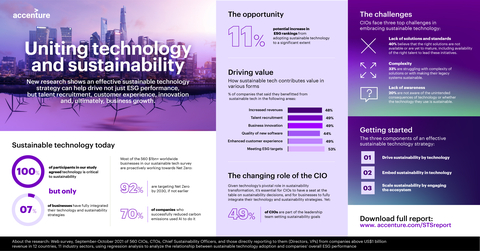CIOs must seize opportunity to advance sustainability to deliver value, tangible outcomes and sustainable impact across their organizations
As businesses set more ambitious environmental, social and governance (ESG) goals, their sustainability and technology strategies need to become more tightly aligned to gain competitive advantage, financial value and a lasting positive impact on society and the environment, according to new research from Accenture (NYSE: ACN). However, only 7% of respondents have fully integrated their business, technology and sustainability strategies today.
This press release features multimedia. View the full release here: https://www.businesswire.com/news/home/20220606005947/en/

As businesses set more ambitious ESG goals, their sustainability and technology strategies need to become more tightly aligned to gain competitive advantage, financial value and a lasting positive impact on society and the environment, according to new research from Accenture. (Photo: Business Wire)
All 560 companies surveyed as part of the report, Uniting Technology and Sustainability: How to Get Full Value From Your Sustainable Technology Strategy, ranked technology as important or very important for achieving their sustainability goals. While companies see clear value in having an integrated strategy, they cite a lack of solutions and standards (40%), complexity (33%) and lack of awareness of unintended consequences of technology (20%) as barriers to reaching their goals. This gap between intent and action leads companies to make trade-offs between business and sustainability goals – trade-offs that can be reduced or eliminated with a holistic, sustainable technology strategy.
Chief Information Officers (CIOs) can play a critical role in supporting their company’s overall transformation efforts and should have a seat at the table on sustainability decisions. But most do not. In fact, only 49% of CIOs are part of the leadership team setting sustainability goals, and just 45% are assessed on achieving these goals.
“Every business must be a sustainable business and technology is a critical and fundamental enabler –from improving transparency and traceability in global supply chains, to helping measure and reduce carbon emissions,” said Sanjay Podder, Technology Sustainability Innovation lead at Accenture. “It is no longer simply optional to put sustainability at the core of how organizations operate. A sustainable technology strategy – one that embeds sustainability in technology, drives sustainability by technology, and scales sustainability by engaging the ecosystem – will help companies deliver 360° value and contribute to the achievement of their broader sustainability goals.”
An effective sustainable technology strategy helps drive business growth and ESG performance by delivering on three key imperatives:
- Sustainability by technology: Using the power of technology to enable and accelerate sustainability efforts across the organization. Ninety-two percent of companies surveyed aim to achieve net-zero targets by 2030, which will require deployment of advanced technologies to measure, reduce and remove an organization’s carbon footprint. Technology is also key for moving toward responsible value chains; promoting sustainable choices for customers; and building a sustainable organization. Of the companies surveyed that successfully reduced emissions in production and operations, 70% used artificial intelligence (AI) to do it.
- Sustainability in technology: Protecting people and the planet by making technology itself progressively more sustainable. As more people go online and the use of technology increases, so do the carbon emissions from IT. Embracing green software that is both carbon efficient and carbon aware; building trustworthy systems that incorporate privacy, fairness, transparency, robustness and accessibility; and instituting the right governance mechanisms must be prioritized. Only two of the 560 companies surveyed said they consider energy efficiency at all stages of the software development lifecycle, indicating considerable room for improvement. The report identifies a robust green software development framework that prioritizes material emissions areas including the software development life cycle, as well as green digital experience, cloud, edge, data centers, AI, distributed ledger technology and infrastructure.
- Sustainability at scale: Pursuing breakthrough innovation with ecosystem partners to develop radically different and more sustainable ways of doing business in the future. No organization can address global sustainability challenges at scale on its own. Companies must work beyond the boundaries of their own organizations to meet the United Nations Sustainable Development Goals (SDGs). Forty-three percent of companies surveyed are now joining industry collaborations, alliances and advocacy groups focused on eco-friendly technology.
Podder added, “Creating and implementing a comprehensive sustainable technology strategy – one that uses technology to drive sustainability at scale while also making technology itself more sustainable – is now the core mission of the purpose-driven CIO. The responsibility is huge, but the opportunity to drive new sources of value and lead the way to a more sustainable future is even bigger.”
Accenture is committed to sustainability across each of the three imperatives, embedding sustainability in everything it does and with everyone it works with. In fact, 95% percent of Accenture’s applications are in the public cloud. A founding and steering member of the Green Software Foundation, Accenture is helping to set standards and catalyze action across industries. It has developed its own green software framework, tools and best practices, and has trained more than 70,000 of its developers on sustainable software engineering practices. Accenture also collaborates with partners—from the largest software and cloud companies to small, disruptive innovators—to help clients achieve their sustainability objectives and deliver outcomes.
Research Methodology
The research was conducted in September and October 2021 via a web survey. The sample comprised of 560 CIOs, CTOs, chief sustainability officers, and those directly reporting to them (directors, VPs) from companies with more than US$1 billion revenue. The research spanned 12 countries and 11 industries.
About Accenture
Accenture is a global professional services company with leading capabilities in digital, cloud and security. Combining unmatched experience and specialized skills across more than 40 industries, we offer Strategy and Consulting, Technology and Operations services and Accenture Song—all powered by the world’s largest network of Advanced Technology and Intelligent Operations centers. Our 699,000 people deliver on the promise of technology and human ingenuity every day, serving clients in more than 120 countries. We embrace the power of change to create value and shared success for our clients, people, shareholders, partners and communities. Visit us at accenture.com.
View source version on businesswire.com: https://www.businesswire.com/news/home/20220606005947/en/
Contacts
Hannah Unkefer
Accenture
+1 206 839 2172
hannah.m.unkefer@accenture.com






